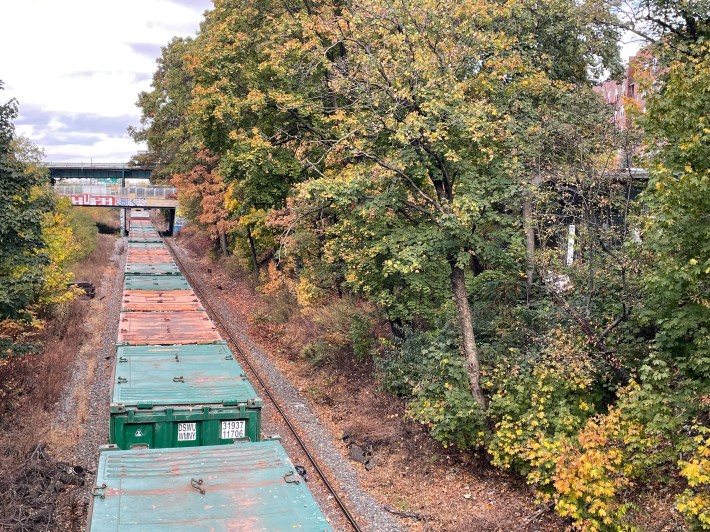In this case, tunnel vision is a good thing.
The MTA no longer plans to hijack its future Brooklyn-Queens light rail project by running a segment of it on the street, agency leadership announced on Tuesday.
Instead, agency leaders told reporters on Tuesday that they will heed the warnings from outside advocates and explore building a tunnel under All Faiths Cemetery instead of running the Interborough Express down busy Middle Village streets.
"We're looking at a tunnel at Metropolitan Avenue, which will allow us to avoid street running to make the [Interborough Express] faster and more reliable," MTA President of Construction and Development Jamie Torres-Springer told reporters during a press conference on a condom-strewn lot in Queens.
"This will save every rider a few minutes and enable us to run in a dedicated right-of-way the whole 14 miles, which brings us a whole lot of efficiency."
The existing right-of-way between Bay Ridge and Jackson Heights is already used by freight trains, but the MTA initially planned to avoid tunneling under the graveyard by routing the light rail line on Metropolitan Avenue, 69th Street and 69th Place for two-thirds of a mile.
Almost from the moment the project was announced in 2022, transit advocates expressed concerns about those street-running plans, since the on-street section wasn't guaranteed to get a dedicated space on the road separated from regular traffic. Advocates from the Effective Transit Alliance who made the case that the street running could be avoided with a 515-foot long tunnel celebrated Tuesday's news and pledged to keep pushing for the cheapest tunneling option.
"We are ecstatic that the MTA made the right decision to build a tunnel through All Faiths Cemetery," said ETA Executive Director Blair Lorenzo. "For the price of a single, short tunnel, IBX riders will get faster, more frequent, and more reliable trips for decades to come. We will work to ensure the MTA keeps to their word and builds a shallow, inexpensive tunnel, but this is an investment well worth making."
Right now, freight trains already run underneath All Faiths Cemetery in a 520-foot tunnel, but the MTA has said that it does not want to share tracks with freight operations. With that in mind, Torres-Springer said that the exact shape of the tunnel will be determined during the engineering study, but that the agency hopes for a relatively minor tunneling effort.
"We're looking at the shorter version of the tunnel, which is the either expansion of the existing one, or it could be a new tunnel adjacent to that one," he said.
The engineering process should take about two years, as would an environmental assessment of the project's potential impacts, the MTA said.
Officials on Tuesday showed off exactly where the Interborough Express would terminate in Jackson Heights — near the lot where the press conference was held. In the photo below, light-rail platforms would go on the left-hand side of the freight line to allow for transfers to the 74th St–Jackson Hts–Roosevelt Av subway station:

The future of the IBX is far from certain, however.
The MTA's 2025-2029 capital plan, which would partly fund the project, currently costs $68 billion and focuses heavily on state of good repair work that agency leadership has emphasized needs to get done and soon. The plan includes $3 billion for work on the $5.5 billion IBX, the bulk of it listed as a $2.45 billion commitment in 2029
At least $33 billion of the capital plan is currently unfunded. Gov. Hochul, the IBX's prime political booster, recently threw cold water on the $68 billion price tag — suggesting elements of the proposed capital plan could be on the chopping block.
Hochul, Majority Leader Andrea Stewart-Cousins and Assembly Speaker Carl Heastie each have the power to veto the capital plan and send it back to the MTA for pruning by the end of the year through their positions on the Capital Plan Review Board.
MTA leaders are in wait and see mode when in response to the governor's comments — but were up front on Tuesday about what it would mean if the plan was trimmed or not funded.
"We've been very upfront about saying that the first priority has to be the state of good repair, not letting the existing system continue to degrade or place the functionality of the systems at risk," MTA CEO and Chairman Janno Lieber said of the leaders. "There's no question that means that expansion would be placed at risk by a shortfall. But the response to the proposal that we made has been so positive that we're very optimistic about how things are going to go down come the legislative session."






